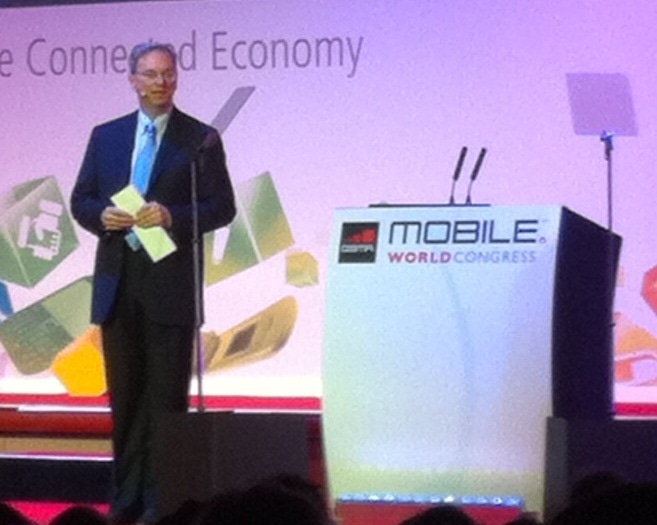Google’s Eric Schmidt wants “an Android in every pocket”
Google’s chairman Eric Schmidt has said that there will be an Android device in every pocket if the search and advertising company “gets it right”. Delivering a keynote speech at the Mobile World Congress in Barcelona Schmidt said that this would be accomplished through significant cost reductions, as this year’s US$400 phone would be next year’s US$100 phone. The aim he said was a US$70 smartphone as this was an inflection point where a new market of opportunity arose.
February 29, 2012

Google’s chairman Eric Schmidt has said that there will be an Android device in every pocket if the search and advertising company “gets it right”. Speaking at the Mobile World Congress in Barcelona, Schmidt said that this would be accomplished through significant handset cost reductions, and predicted that this year’s US$400 phone would be next year’s US$100 phone. The aim, he said, was a US$70 smartphone, as this was an inflection point where a new market of opportunity arose.
The charismatic Google chairman opened his talk with a run through of the main features of Google’s new Chrome browser for Android, and each of its impressive features, such as a link preview pop-up and a stylish tabbed browsing view, were greeted with Apple-like rapture by a partisan audience.
Schmidt went on to explain that while smartphone marketshare had seen impressive growth, on a global scale the digital divide was still huge as for every person online there were three that were not.
Schmidt predicted that for the privileged few the continuing success of Moore’s law would ensure that the future would bring devices offering effectively unlimited speed and processing power. Such technology would enable projects such as Google’s self-driving cars to become reality, and, rather more bizarrely, robots that could attend rock concerts on your behalf if you can’t attend, which would transmit the experience to you via holo-projections.
He also waxed lyrical about the eventual state of technology to become less important as it integrates seamlessly with people’s lives. “The web will be like everything and like nothing. Like electricity, it will always be there.”
After predicting that there would eventually be an Android phone in every pocket Schmidt explained that even in the absence of internet connectivity, such devices could talk directly to each other via mesh networks, this creating virtual communities, that would act as a “digital watering hole”.
Schmidt also addressed various issues such as the cost of internet access for developing nations, suggesting that the key to doing this was to keep the content as local as possible through caches, due to the last 10 miles of access usually the most expensive part.
He also expressed sympathy with the current plight of telecom operators stating that, “it’s very difficult to be a telecom operator right now. It’s a difficult regulatory environment, difficult to raise your [tariffs] plan and you have to upgrade to 4G when it’s difficult to raise capital. And all the while customers are using enormous amounts of data and governments are charging loads for more bandwidth”. Despite this expression of empathy however, there was no indication that Google would be making any direct financial contribution to ease the plight of operators anytime soon, stating only that Google was, “investing heavily in applications that will drive the excitement about wireless data. That is the only source of growth right now, and the operators will be able to recoup [costs] through this.”
Advice for regulators were also proffered, with Schmidt suggesting that they had, “a tendency to regulate what it happening now rather than the outcome. The unintended cost of regulation is a loss of innovation.”
Schmidt also manged to turn a tense moment into one of mirth following a request from an Iranian audience member to remove the ban on downloading the Chrome browser in his country. Schmidt said that there was nothing he could do as US imposed sanctions tied the hands of the search engine provider and when the person expressed disappointment Schmidt responded, “I’m with you – but in prison – there’s like, no bandwidth.”
About the Author(s)
You May Also Like











_1.jpg?width=300&auto=webp&quality=80&disable=upscale)


.png?width=800&auto=webp&quality=80&disable=upscale)